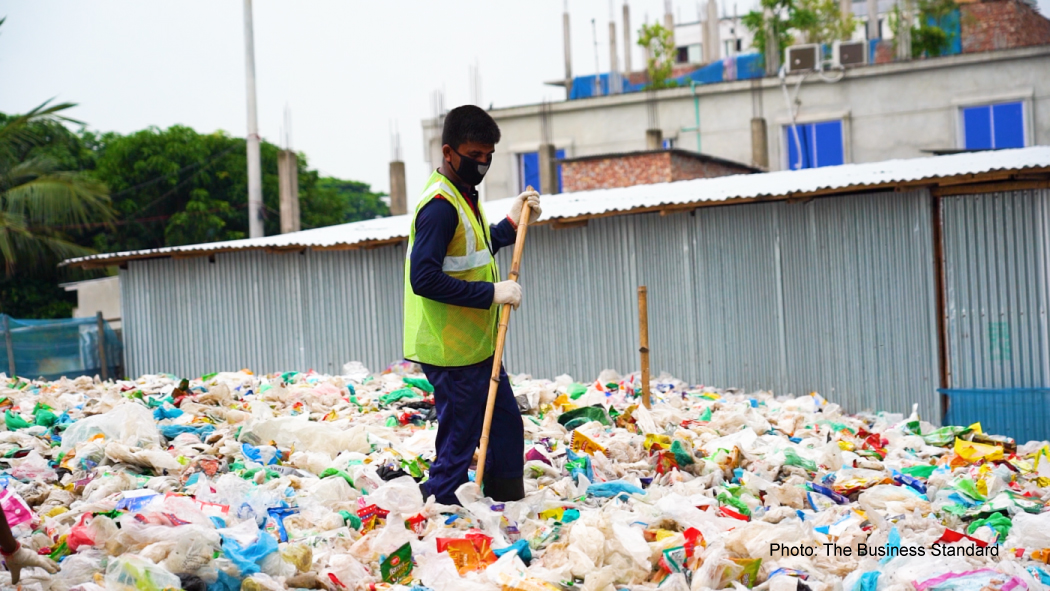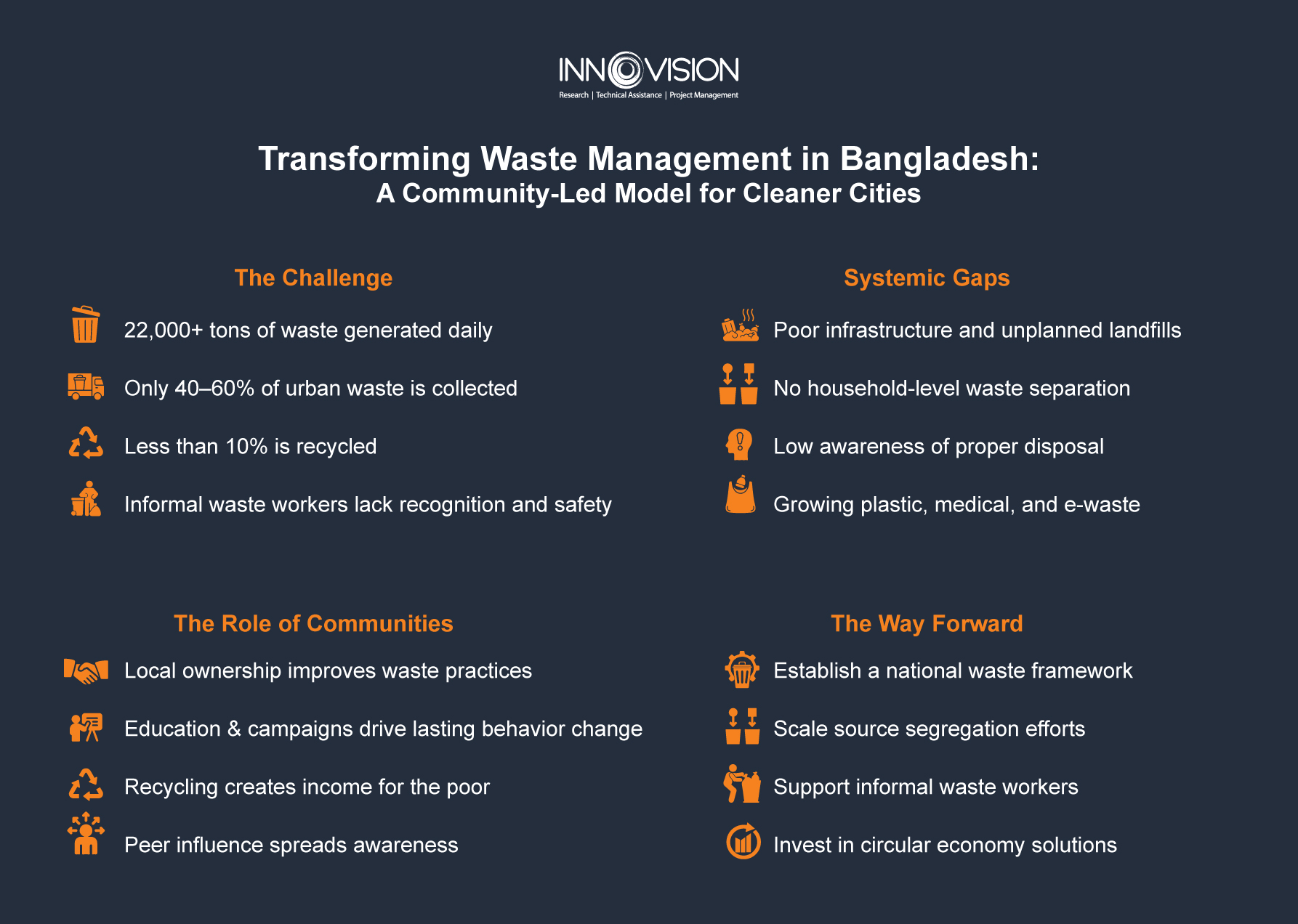
Bangladesh is facing a growing waste management challenge that threatens public health, the environment, and urban resilience. With over 22,000 tons of solid waste produced every day, most cities are struggling to keep up (World Bank, 2023). In Dhaka, only 40–60% of waste is formally collected, and less than 10% is recycled (Department of Environment, 2021). The rest is burned, dumped, or left to pollute air, water, and soil.
This problem is growing faster due to urbanization, population growth, and increased consumption. But amid the challenge, promising shifts are happening. New policies, private-sector partnerships, and community-led initiatives are beginning to reshape how waste is managed in Bangladesh.
One standout example is the community-driven waste management project in Jhenaidah, led by Innovision Consulting under the initiative “Technical and Societal Innovation for Delivering Access to Community-Wide Affordable Cylindered CBG for Cooking and Sustainable Fertilizer.” The project shows how empowering communities and improving systems can lead to real, lasting change.

Why Waste Management Falls Short
Most local governments in Bangladesh don’t have the tools or funding to manage waste effectively. Landfills are poorly maintained. There’s little investment in sorting or recycling facilities. Informal waste workers, who handle much of the country’s recycling, often work without proper safety, recognition, or support.
Public behavior is another hurdle. Waste is rarely separated at the household level, and awareness about proper disposal remains low. The rise in plastic, medical, and electronic waste is making things worse, especially in low-income areas.
Why Communities Matter
Infrastructure and policy are important, but they don’t work without community engagement. Around the world and in Bangladesh, evidence shows that when communities are involved, waste systems are more efficient, effective, and sustainable.
Community involvement fosters:
- A sense of ownership, leading to improved sorting, timely disposal, and cleaner public spaces (UN-Habitat, 2010).
- Solutions that are tailored to local needs, increasing the relevance and adoption of new practices (Wilson et al., 2015).
- Enhanced recycling and collection rates, particularly through door-to-door initiatives, volunteer-driven clean-ups, and household education (Scheinberg et al., 2010).
- Environmental awareness through peer influence, school programs, and neighborhood campaigns.
- New income-generating opportunities, especially for low-income groups engaged in collection, sorting, or recycling activities (ILO, 2018).

Innovision’s Jhenaidah Model: A Community-Centered Solution
Innovision’s waste management initiative in Jhenaidah illustrates how community participation, institutional support, and behavior-focused strategies can reshape local waste systems. Innovision empowered residents through simple tools, training, and follow-up to start sorting waste at home. Local schools, hotels, and markets also joined the effort to build a wider culture of waste awareness. Alongside awareness campaigns, residents were linked to local scrap dealers, turning recyclable waste into income, especially helpful for low-income families. Municipal authorities came on board too, introducing new collection vans and training for waste workers. To address safety, the project provided hygienic storage containers and ran behavior change campaigns through media and local stories. Together, these efforts offer a scalable model for sustainable, inclusive urban waste management.
Policy Priorities for Scalable Impact
The successes demonstrated in Jhenaidah provide valuable insights for shaping a more resilient and inclusive waste management system across Bangladesh. To make this success the norm, not the exception, Bangladesh needs national-level action. Here’s what should come next:
- Establishing a national waste management framework that unifies standards, decentralizes accountability, and integrates municipal operations.
- Investing in waste infrastructure, including composting units, material recovery facilities, and environmentally secure landfills.
- Launching a nationwide campaign for source segregation, beginning with public institutions and high-volume waste generators.
- Formalizing the informal sector by providing training, safety gear, and recognition to waste pickers and recyclers.
- Promoting circular economy principles, ensuring that waste is reused, repurposed, or converted into energy or fertilizer, reducing reliance on raw materials and landfill space.
Conclusion: Communities Drive Change
Bangladesh’s waste crisis is serious, but solvable. The tools and ideas already exist. What’s needed is the will to scale them. Innovision’s work in Jhenaidah shows that when communities are engaged, change is not only possible, it’s powerful. By investing in people, policy, and systems together, Bangladesh can turn its waste problem into a national opportunity for cleaner cities, greener growth, and a healthier future.
References
- World Bank. (2023). “Building Back a Greener Bangladesh: Country Environmental Analysis. https://openknowledge.worldbank.org/handle/10986/30317
- Department of Environment, Bangladesh. (2021). Urban Solid Waste Management Strategy. Ministry of Environment, Forest and Climate Change.
- UN-Habitat (2010). Solid Waste Management in the World’s Cities. https://unhabitat.org/sites/default/files/2021/02/solid_waste_management_in_the_worlds_cities_water_and_sanitation_in_the_worlds_cities_2010.pdf
- Wilson, D. C., et al. (2015). Global Waste Management Outlook. UNEP/ISWA. https://eprints.whiterose.ac.uk/id/eprint/110512/1/UNEP%20ISWA%20GWMO%20%20Chapter%203%20-%20Waste%20Management%20-%20Global%20Status.pdf
- Scheinberg, A., et al. (2010). Economic Aspects of the Informal Sector in Solid Waste Management. GIZ. https://mia.giz.de/dokumente/bib-2010/gtz2010-0896en-informal-sector-solid-waste-management.pdf
- ILO (2018). Women and Men in the Informal Economy: A Statistical Picture (3rd ed.). https://www.ilo.org/sites/default/files/202404/Women_men_informal_economy_statistical_picture.pdf
- Innovision Consulting. (2023). GESI and Waste Management Survey Report: Jhenaidah District.
Author: Tamanna Mastura, an Associate in the Economic Growth Portfolio at Innovision Consulting.